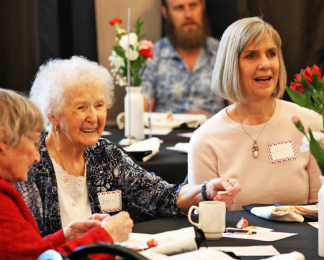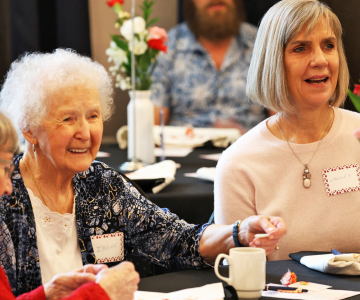Thirty-year-old Brittany is loving life these days.
She has a job she loves, a new puppy (adorably named Cali – short for California Roll), a cozy home, a vehicle, and recently got engaged. Most importantly, the Kelowna resident who was formerly homeless has control of the opioid addiction that previously cost her everything.
Brittany credits Opioid Agonist Treatment along with the support of her fiancé and people she met through Narcotics Anonymous for successfully turning her life around.
Opioid Agonist Treatment (OAT) describes medicines prescribed by doctors and specialized nurses to help stabilize people who are addicted to opioids like heroin and fentanyl.
“My mother passed away a year ago from her addiction to alcohol. That really made me decide I wanted to get on a better path,” she says.
Now, as Interior Health’s first peer services worker in the OAT program, Brittany is using her personal experience to help others navigate access to medications and additional substance use supports.

Although everyone’s experience of addiction and recovery is unique, OAT is considered the first choice for treating people who are addicted to opioids. It involves the use of long-acting medications - within Interior Health these typically include buprenorphine/naloxone (Suboxone) and methadone. Over the last several years there have been some additional treatment options introduced, including slow-release oral morphine (Kadian), Sublocade (injectable buprenorphine, an injection given once every four weeks), and injectable opioid agonist therapy (currently available in Kelowna, and there is a tablet injectable program in Kamloops).
OAT medications are generally given once per day and relieve withdrawal symptoms and cravings, reduce illicit opioid use, decrease risk of overdose and reduce the risk of transmission of serious viral infections, such as HIV and hepatitis C.
“Opioid Agonist Treatment, when adequately dosed, results in retention rates of 60-80 per cent, with only a minority of patients continuing to use illicit opioids,” says Dr. Leslie Lappalainen, Interior Health’s addiction medicine lead.
"OAT is better than withdrawal management alone (i.e. detox), and when we compare it to behavioral treatments, like inpatient treatment or counselling, patients who are on OAT tend to have longer periods of abstinence from opioids, stay engaged in addictions treatment for longer periods, and have lower rates of illness such as infections, as well as lower rates of death.”
“Opioid use disorder has really good outcomes when treated!” says Dr. Lappalainen. “People do really well on treatment. Generally the treatments are a longer-term treatment with a gradual taper off, as the outcomes are much better when done this way, as opposed to really short treatment periods, or rapid tapers off OAT.”
For Brittany, who recently marked her one-year anniversary since quitting illicit opioids, the future looks bright.
“I’m looking forward to starting a family of my own, one in which I can set a good example for my children as a mother who is strong, healthy, happy, and free of addiction - something I didn’t have when I was growing up.”
To learn more about OAT and opioid use disorder, visit














